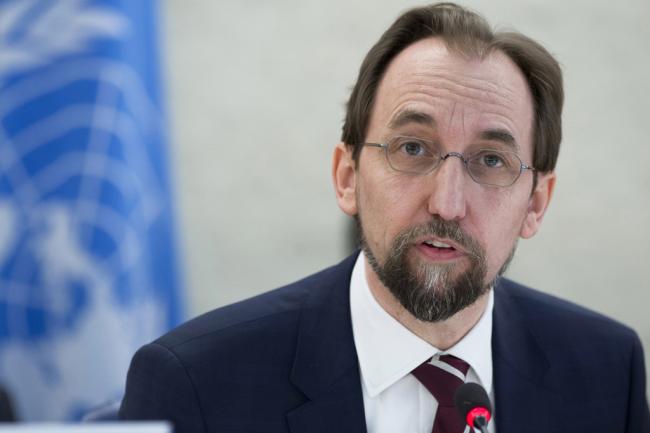
Torture during interrogations not just wrong but also counterproductive – UN rights chief
“Abundant scientific and historical evidence demonstrates that the information yielded by people who are being subjected to violence is unreliable,” High Commissioner for Human Rights Zeid Ra'ad Al Hussein said at the event, entitled “Torture during Interrogations – Illegal, Immoral, and Ineffective.”
The torture of detainees, who are captive and cannot defend themselves, also creates enormous rage among their larger communities, he added. “By feeding the desire for vengeance, torture produces more hatred and more violence.”
On Friday ’s event, organized by the High Commissioner’s Office (OHCHR) and held on the sidelines of the annual high-level segment of the General Assembly, sought to inform discussions among Member States about the development of standards and guidelines on investigative interviewing by police and other law enforcement agencies, with the aim of assisting States to meet their fundamental legal obligations to prevent torture and ill-treatment.
Among the participants in the event were the lead investigative interviewer in the Anders Behring Breivik case in Norway, and a former NCIS Deputy Assistant Director for Counterterrorism from the United States.
The High Commissioner noted that people who are in police custody for a very broad range of reasons are frequently subjected to torture or other forms of ill-treatment. This is particularly true, he said, in the first hours and days after their arrest, when – although they should benefit from the presumption of innocence – suspects may have no access to legal assistance or independent medical examination, and have not been brought before a judge.
“Alarmingly, in the past, some States have resorted to using psychologists to design brutal interrogation methods such as waterboarding, forcing detainees into small containers, forcing them to hold painful positions for hours or slamming them into flexible walls,” he stated.
“Furthermore, conditions for detainees are often so squalid and inadequate that they may amount to torture or other forms of ill-treatment under the terms of the Convention against Torture. This is true even in numerous developed countries.”
The High Commissioner cited the example of an allegation in which a pre-trial detainee in one of the richest countries in the world had died after prison guards cut off his water supply for seven days, to punish him for a violent outburst – leading to his death from dehydration.
“These abuses should matter, very deeply, to every member of the community,” he said. “Not only do they violate the rights of the individuals concerned, they also corrode what should be the protective and principled function of every police force.
“Officials required to enforce the law should not undermine the rule of law,” he continued. “If police break the law in pursuit of law enforcement, the message is one of capricious and abusive power. The institution which should protect the people becomes unmoored from principle; unresponsive to the law, it is a loose cannon.
“This destruction of public trust is profoundly damaging. When added to the perception that police abuses and humiliation of specific communities is tolerated – based on economic, geographic, ethnic, religious or other distinctions – it will certainly exacerbate tensions and may lead to serious violence.
OHCHR is planning to co-create a Manual on Investigative Interviewing, with the UN’s Police Division, for use by UN police officers. The Convention against Torture Initiative and the Norwegian Centre for Human Rights are also preparing guidance on investigative interviewing that does not rely on threats and brutality.
UN Photo/Jean-Marc Ferré
Source: www.justearthnews.com
Support Our Journalism
We cannot do without you.. your contribution supports unbiased journalism
IBNS is not driven by any ism- not wokeism, not racism, not skewed secularism, not hyper right-wing or left liberal ideals, nor by any hardline religious beliefs or hyper nationalism. We want to serve you good old objective news, as they are. We do not judge or preach. We let people decide for themselves. We only try to present factual and well-sourced news.







